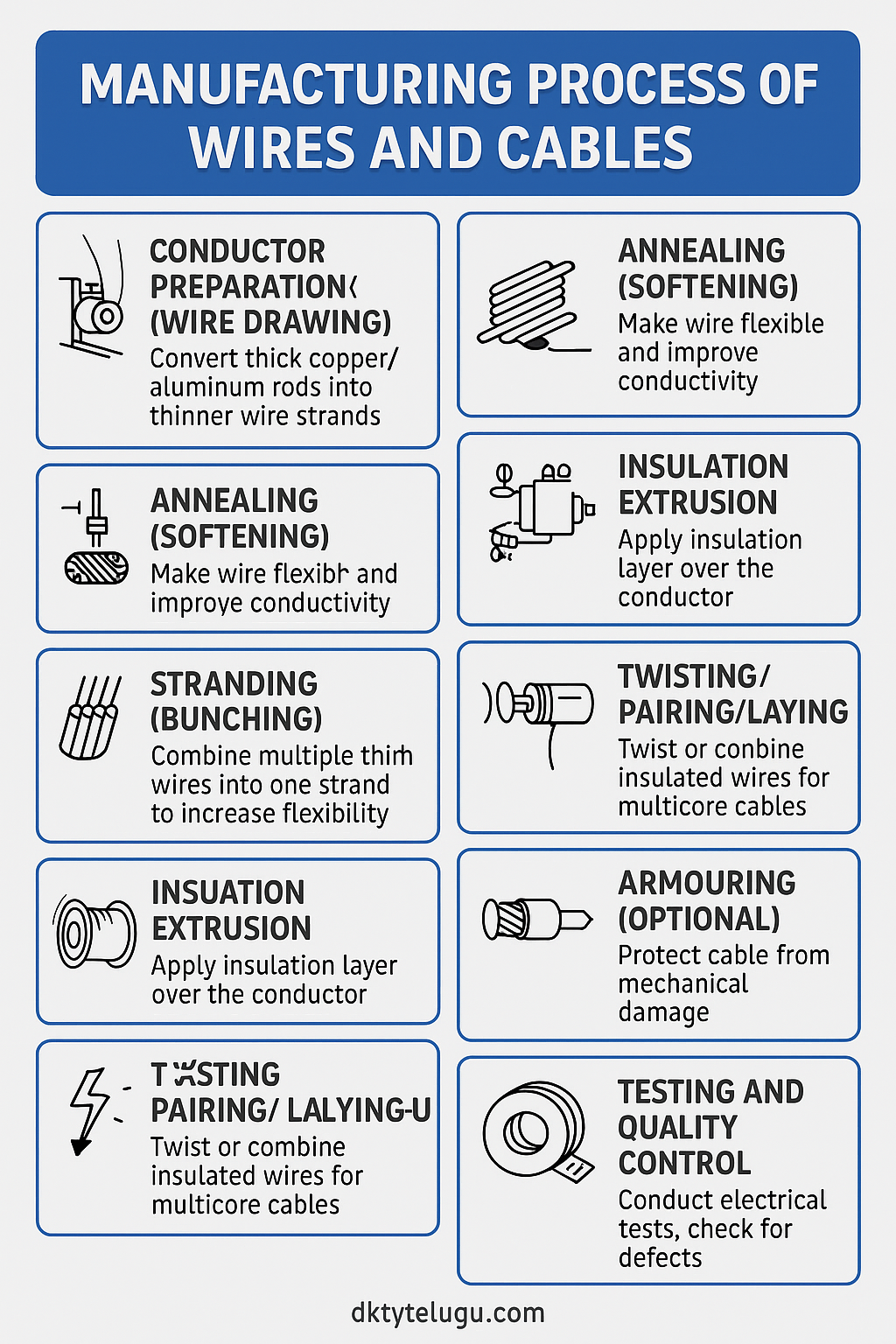Raw Materials Used
| Material | Used For | Specification |
|---|---|---|
| Electrolytic Copper | Conductors | ≥ 99.97% purity (IS 8130:1984) |
| Aluminum Rods | Conductors | EC Grade (IS 8130:2013) |
| PVC Compound | Insulation/Sheathing | FR, FRLS, HRFR, Type A/B (IS 5831:84) |
| XLPE | Special cables | For high temp or voltage apps |
| Galvanized Steel | Armoring | IS:3975 |
Step-by-Step Deep Manufacturing Process
1️⃣ Wire Drawing (Breakdown of Rods to Fine Wires)
- Input: 8 mm Copper/Aluminum Rod.
- Machine: Rod Breakdown Machine (multi-die or single die).
- Process:
- Rod passes through carbide dies to reduce diameter to 1.5mm–0.5mm.
- Speed: 25–35 m/s.
- Cooling: Through lubricant emulsion or water.
- Tension Control: Maintained by dancer arms or loop controllers.
Critical Check:
- Surface finish must be smooth.
- No burrs or cracks.
2️⃣ Annealing (Softening Conductors)
- Purpose: Enhances conductivity & flexibility by removing drawing stress.
- Machine: Online or offline annealer.
- Process:
- Heated to 350–500°C.
- Passed through nitrogen (inert) atmosphere to avoid oxidation.
- Then cooled quickly in water.
Critical Check:
- Final resistivity ≤ 0.01724 Ω·mm²/m (as per IS 8130).
- Elongation should be ≥ 20%.
3️⃣ Bunching / Stranding
- Purpose: Combine several wires into 1 flexible conductor.
- Machine: Bunching or stranding machine (planetary or rigid strander).
- Standard: IS 8130 class 2 or 5.
- Types:
- 7/0.3 mm
- 14/0.3 mm
- 36/0.3 mm etc.
- Lay length controlled for optimal flexibility and conductivity.
Critical Check:
- Conductor must be circular and compacted.
- No wire overlaps or uneven twists.
4️⃣ Insulation Extrusion
- Machine: Extrusion Line with crosshead and extruder (typically 60–90mm screw).
- Material: PVC, HR PVC, FRLS, LSZH, XLPE.
- Temperature: 140–170°C (varies by compound).
- Die: Controls insulation thickness (usually 0.6mm–1mm).
- Cooling: Water trough after extrusion.
Critical Check:
- Concentricity and uniform thickness.
- Spark test at 6–10 kV inline (detects pinholes).
- Adherence of insulation to conductor.
5️⃣ Coloring / Striping (Optional)
- Done for identification of wires in multi-core cables.
- Method: Inline inkjet printer or co-extrusion with colored PVC.
6️⃣ Twisting or Laying Up (Multicore Cables)
- Machine: Laying up machine.
- Core Types: 2, 3, 4, or 5 cores.
- Lay Pitch: Adjusted based on cable type.
Critical Check:
- No crossing or gaps between cores.
- Correct color code (as per IS 694).
7️⃣ Inner Sheath (for Multi-core or Armoured Cables)
- Material: Type ST1/ST2 PVC compound (IS 5831).
- Purpose: Bind the cores and provide a bedding for armoring.
- Thickness: As per IS 1554 standards.
Critical Check:
- No air gaps or wrinkles.
- Uniform bedding without breaks.
8️⃣ Armoring (Optional)
- Material: Galvanized Steel Strip (STA) or Wire (SWA).
- Process:
- Applied helically using armoring machine.
- Covered over inner sheath for protection from mechanical damage.
Use Case: For underground cables, industrial power cables.
9️⃣ Outer Sheathing (Final Layer)
- Material: PVC (FR/FRLS/HRFR), PE, or LSZH.
- Machine: Sheathing Extrusion Line.
- Markings: Brand name, size, ISI mark, voltage, year.
Critical Check:
- No burn marks, air bubbles, or color mismatch.
- Hot Spark Test (as per ISI) to check for surface defects.
Final Quality Control & Testing
Standard Tests (As per IS 694/IS 1554)
| Test Name | Parameters Checked |
|---|---|
| Conductor Resistance | Ohm/km (at 20°C) |
| Insulation Resistance | MΩ·km |
| High Voltage Withstand Test | 3 kV for 5 minutes (PVC wires) |
| Elongation & Tensile Strength | PVC: >100%, Tensile >12.5 MPa |
| Spark Test | 6–10 kV AC for insulation pinhole detection |
| Flammability Test | Flame spread under controlled flame (FR test) |
| Oxygen Index Test | For FRLS/LSZH wires – must be >29% O₂ |
| Smoke Density Test | For FRLS – measured in Ds units |
Coiling, Printing & Packaging
- Length: 90m / 100m standard coils.
- Packaging: Shrink-wrapped or boxed.
- Label Includes:
- Cable type (e.g., 1.0 sqmm FR)
- Voltage grade (e.g., 1100V)
- ISI license number
- Manufacturing date
- MRP and barcode
🔴 DKTV Telugu – మీకు ప్రతిరోజూ తోడుగా!
DKTVTelugu.com బ్లాగ్లో మీకు ప్రతి రోజు గోల్డ్ రేట్లు, స్టాక్ మార్కెట్ అప్డేట్స్, ప్లాస్టిక్ మరియు మెటల్ ధరలు, ఎలక్ట్రికల్ ఉత్పత్తుల తయారీ సమాచారం అందించబడుతుంది.
📌 మమ్మల్ని ఫాలో అవ్వండి: YouTube, Instagram, Telegram
మాన్షన్ కేబుల్స్ (అనగా హౌస్ వైర్లు) ఎలా తయారవుతాయి అనే వివరాలు ఈ బ్లాగ్లో తెలుసుకుందాం. ప్రతి దశలో ఉపయోగించే యంత్రాలు, పదార్థాలు, మరియు టెస్ట్ల వివరాలు ఇక్కడ ఉన్నాయి.
DKTV Telugu Official Links
Website (Main Blog):
🌐 https://dktvtelugu.com
📺YouTube Channel:
https://www.youtube.com/@dktvtelugu
📸 Instagram:
https://www.instagram.com/dktvtelugu
📢 Telegram Channel:
📲 https://t.me/dktvtelugu
✍️ Quora Profile:
🔍 https://www.quora.com/profile/DKTV-Telugu
📘 Facebook Page:
https://www.facebook.com/dktvtelugu
📌 Pinterest:
https://www.pinterest.com/dktvtelugu
🐦 X (Twitter):
https://twitter.com/dktvtelugu
💼 LinkedIn:
🔗https://www.linkedin.com/company/dktvtelugu
📲 WhatsApp Channel (if available):
https://whatsapp.com/channel/dktvtelugu (Update this if you have the correct link)
